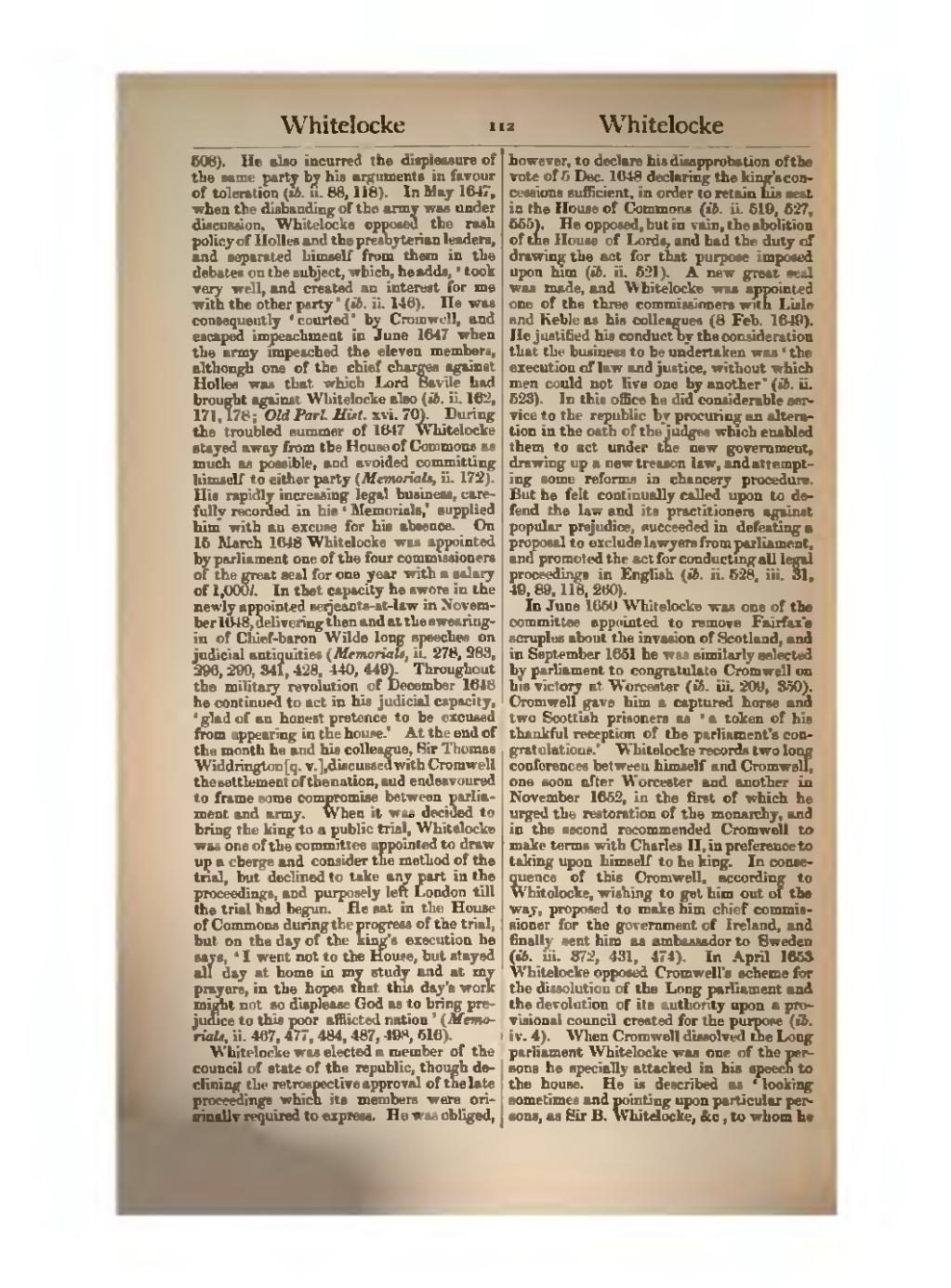508). He also incurred the displeasure of the same party by his arguments in favour of toleration (ib. ii. 88, 118). In May 1647, when the disbanding of the army was under discussion, Whitelocke opposed the rash policy of Holles and the presbyterian leaders, and separated himself from them in the debates on the subject, which, he adds, ‘took very well, and created an interest for me with the other party’ (ib. ii. 146). He was consequently ‘courted’ by Cromwell, and escaped impeachment in June 1647 when the army impeached the eleven members, although one of the chief charges against Holles was that which Lord Savile had brought against Whitelocke also (ib. ii. 162, 171, 178; Old Parl. Hist. xvi. 70). During the troubled summer of 1647 Whitelocke stayed away from the House of Commons as much as possible, and avoided committing himself to either party (Memorials, ii. 172). His rapidly increasing legal business, carefully recorded in his ‘Memorials,’ supplied him with an excuse for his absence. On 15 March 1648 Whitelocke was appointed by parliament one of the four commissioners of the great seal for one year with a salary of 1,000l. In that capacity he swore in the newly appointed serjeants-at-law in November 1648, delivering then and at the swearing-in of Chief-baron Wilde long speeches on judicial antiquities (Memorials, ii. 278, 283, 296, 299, 341, 428, 440, 449). Throughout the military revolution of December 1648 he continued to act in his judicial capacity, ‘glad of an honest pretence to be excused from appearing in the house.’ At the end of the month he and his colleague, Sir Thomas Widdrington [q. v.], discussed with Cromwell the settlement of the nation, and endeavoured to frame some compromise between parliament and army. When it was decided to bring the king to a public trial, Whitelocke was one of the committee appointed to draw up a charge and consider the method of the trial, but declined to take any part in the proceedings, and purposely left London till the trial had begun. He sat in the House of Commons during the progress of the trial, but on the day of the king's execution he says, ‘I went not to the House, but stayed all day at home in my study and at my prayers, in the hopes that this day's work might not so displease God as to bring prejudice to this poor afflicted nation’ (Memorials, ii. 467, 477, 484, 487, 498, 516).
Whitelocke was elected a member of the council of state of the republic, though declining the retrospective approval of the late proceedings which its members were originally required to express. He was obliged, however, to declare his disapprobation of the vote of 5 Dec. 1648 declaring the king's concessions sufficient, in order to retain his seat in the House of Commons (ib. ii. 519, 527, 555). He opposed, but in vain, the abolition of the House of Lords, and had the duty of drawing the act for that purpose imposed upon him (ib. ii. 521). A new great seal was made, and Whitelocke was appointed one of the three commissioners with Lisle and Keble as his colleagues (8 Feb. 1649). He justified his conduct by the consideration that the business to be undertaken was ‘the execution of law and justice, without which men could not live one by another’ (ib. ii. 523). In this office he did considerable service to the republic by procuring an alteration in the oath of the judges which enabled them to act under the new government, drawing up a new treason law, and attempting some reforms in chancery procedure. But he felt continually called upon to defend the law and its practitioners against popular prejudice, succeeded in defeating a proposal to exclude lawyers from parliament, and promoted the act for conducting all legal proceedings in English (ib. ii. 528, iii. 31, 49, 89, 118, 260).
In June 1650 Whitelocke was one of the committee appointed to remove Fairfax's scruples about the invasion of Scotland, and in September 1651 he was similarly selected by parliament to congratulate Cromwell on his victory at Worcester (ib. iii. 209, 350). Cromwell gave him a captured horse and two Scottish prisoners as ‘a token of his thankful reception of the parliament's congratulations.’ Whitelocke records two long conferences between himself and Cromwell, one soon after Worcester and another in November 1652, in the first of which he urged the restoration of the monarchy, and in the second recommended Cromwell to make terms with Charles II, in preference to taking upon himself to be king. In consequence of this Cromwell, according to Whitelocke, wishing to get him out of the way, proposed to make him chief commissioner for the government of Ireland, and finally sent him as ambassador to Sweden (ib. iii. 372, 431, 474). In April 1653 Whitelocke opposed Cromwell's scheme for the dissolution of the Long parliament and the devolution of its authority upon a provisional council created for the purpose (ib. iv. 4). When Cromwell dissolved the Long parliament Whitelocke was one of the persons he specially attacked in his speech to the house. He is described as ‘looking sometimes and pointing upon particular persons, as Sir B. Whitelocke, &c., to whom he
